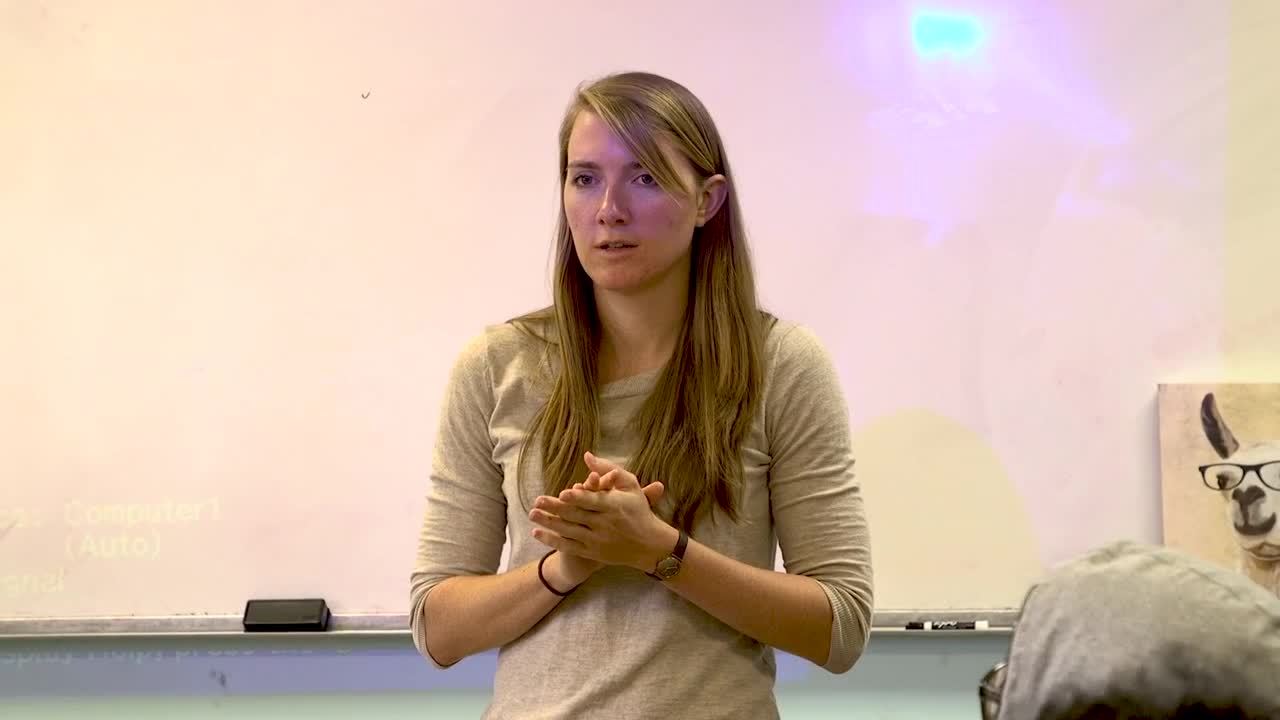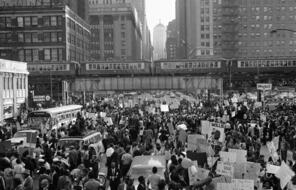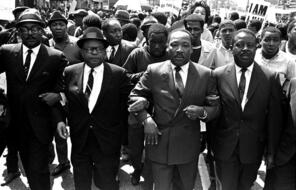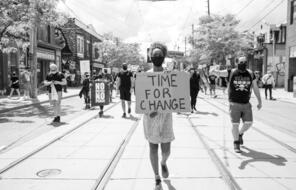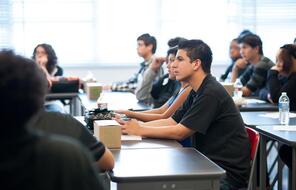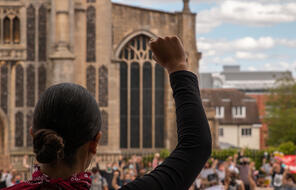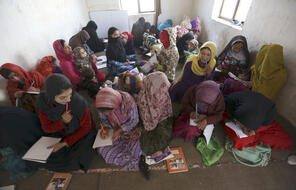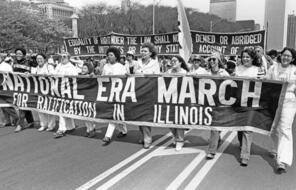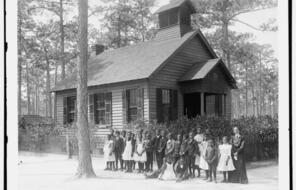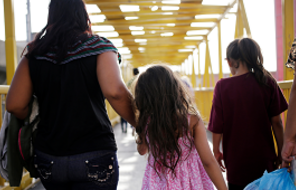[ELENA MAKER] Socratic seminars, in a way, build classroom community in a very academic way. But then again, to think about the pedagogical triangle of Facing History, it brings them in intellectually, but it's also bringing them in emotionally and morally. And they're not just asking questions about history. They're asking questions about how people walk through the world. I think they do have a better understanding of the essential question. It's still not perfect, which is why we did this now. And then, we'll do the research paper in a week or so. And so this was a chance for them to walk away with a bunch of evidence and different ideas. And then, we'll still continue to talk about those. And they'll have to kind of put that together into a more cohesive piece. So they've got puzzle parts right now that we'll put together. McCoy, what question are we answering today in the Socratic seminar? [MCCOY] How do our personal stories influence how we choose to fight for justice? [ELENA MAKER] Right. So remember, we're talking about these civil rights leaders-- their personal stories-- how that influenced their fight for justice. What experiences, what beliefs, encourage them to fight in a specific way? So we're going to be doing the seminar. We're going to do two 8-minute circles each. So you have two opportunities to talk. And the first one, I'm going to give you sticky notes. So every person will have to talk twice before anyone can talk a third time. OK? So you're going to put two sticky notes out on your desk. Once you talk the first time, you take a sticky note away. Once you talk a second time, take a sticky note away. And once all the sticky notes are gone, everyone can talk. But that's just a way of making sure that everyone's voices are heard. On the front of the rubric, you're actually going to put the person's name that you're grading because this will become their rubric. So in a second, you're going to write your person's name. On the back, where it says peer review, you put your name. Final reminder here-- in the seminar, we're looking at the number of comments that you make. So are you an active participant? Are they quality comments? Are they using evidence? Are they building? Do they show real reflection? Are you referencing the text? You're building on each other? And are you asking each other questions? So without further ado, we're going to get started. So the inside circle people are going to bring their evidence packets, bring their sentence starters, join the inner circle. The outer circle is going to move. [KELVIA] I think Angela's story influenced the way she fought because she experienced a lot of violence towards her community and her kind. And she doesn't fight violently, but she does believe in self-defense. And I feel like how she grew up, with all the violence and all the bombings in her neighborhood, really affected the way she fought for justice. [STUDENT 1] I agree with Kelvia because, in the interview, she said, "When someone asks me about violence, I just find it incredible because what it means is that the person who's asking that question has absolutely no idea what black people have gone through, what Black people have experienced in this country since the first time the first Black person was kidnapped from the shores of Africa." For me, that evidence mean that she's probably so much tired that every time there's always some Black person dying or they're getting incarcerated. And she wanted to see a change. But it is just going on, and it won't stop. [STUDENT 2] What do you think Angela meant when she's said "We gather this afternoon on the Native Americans' land." Is she trying to say like, the First People, because I don't really understand that. [STUDENT 3] I think she's saying that the United States land is not ours. [LJ] What do you mean, "ours"? [CHUCKLING] [STUDENT 3] Oh. You said something about Native Americans, right? Yeah, she's probably saying how the land is for Native Americans and that they should rule it. And then, yeah, everything should not be the way it is. [KELVIA] I disagree. I feel like she's saying that the Americans took the land from the natives and gave them no credit of finding it. [STUDENT 4] I agree with Kelvia. [STUDENTS 5] LJ, do you think that it's right for the Black Panthers to protect their community by having guns? Do you think if there could be another way to fight their-- to protect themselves from police brutality? [LJ] Yeah, there is another way. But for them, at the time, being African American wasn't was easy for them to protest about things that this. So I guess having guns is a bad idea, but then again, with the gun thing, they'll probably lose that battle, considering the fact that whites would overpowered them, as just like a group. And I think that they could be more peaceful, per se, but it wouldn't be easy for them to fight, really. [ELENA MAKER] All right. And you'll have to continue the conversation in 8 minutes. We're going to switch. Let's take as second. What have we seen that's been working well so far in these seminars? [STUDENT 6] Asking questions. [STUDENT 7] Making connections. [ELENA MAKER] Asking questions, making connections, using evidence. What else? [STUDENT 8] We haven't disagreed harshly. [ELENA MAKER] You haven't. OK, so you haven't been kind of disrespectful in your disagreement. Good. What are some ways we can make this one even better than the last one? [STUDENT 9] Talk more. [STUDENT 10] Even more questions. [LJ] Ask more questions. [STUDENT 11] Use more evidence. [STUDENT 12] Ask more questions. [ELENA MAKER] OK, so one would be asking more questions. And I would say, sometimes, it's fun to bring other people into the conversation, but also posing questions to the group, and then maybe encouraging people to answer separately than just being like, "what do you think, person?" It might just help open it up a little bit more, but definitely asking more questions. What else? What about evidence? [STUDENT 13] Use more evidence. [ELENA MAKER] Using more evidence. You all have these quotes. I challenge you to use the quotes as the basis of your analysis here. Now, we'll hear what the second circle has to say. Here we go. [STUDENT 14] So the question is, "How do our personal stories influence how we choose to fight for justice?" And I'm going to start with Yuri. I feel like, as a child, she went through tough circumstances within the internment camp. So that basically made her want to fight for it so other Asian Americans wouldn't have to go through the same thing that she did. [STUDENT 15] I think she had a rough childhood, so that led to her wanting to change. So that's probably why she joined some of these groups and helped them out. Because she wants to see change for others and not just herself. [STUDENT 16] I have a question. Do you think the government would have still gave those victims in the internment camp money if Yuri never spoke up about it? [STUDENT 17] No. [STUDENT 18] Probably not. [STUDENT 19] No. [STUDENT 14] She said she felt bad that she wasn't Black. And I kind of feel her-- how she would feel because she saw all these other people going through what they were because they were Black and she wasn't. So, yeah. How do you feel about that, Tanya? [TANYA] I feel like they all kind of faced the same discrimination because they're all oppressed in some way. So I think Yuri-- I feel like she was meant to be there. Because even though she wouldn't the same color as all of them or the same race, she still faced some discrimination. And she should still be in there. [ELENA MAKER] First of all, really nice job. We have a lot to unpack. So first thing is you need to finish grading your partner. So if you haven't finished grading your partner, you need to do that. I gave you an exit ticket, which was to ask what your goals were for the seminar. So your exit ticket is to reread the goals that you had set for yourself. And on the other side of the index card, write about if you think you reached your goals. Why or why not? It was their first Socratic seminar of the year in US history. So I think, in that perspective, it was great. They were able to make connections to the world around them and were able to make these big picture questions that got people thinking. They had a lot of examples, which was great. And they were able to recall a lot from the documentaries that we watched and their different speeches that they watched. So just making sure that, as we're watching those in class and having them record down on the evidence in that moment, so they can use it and really cite it, and say, "In this documentary--." But overall, they showed their good knowledge, I feel like, of what we've been talking about.
